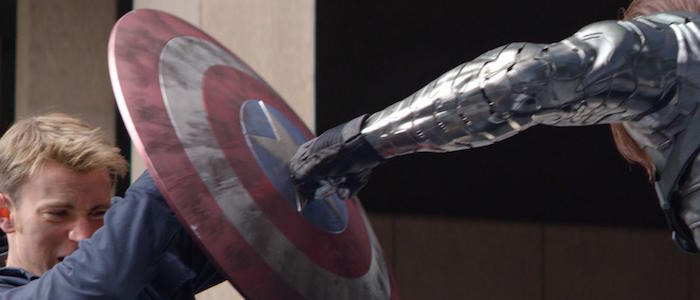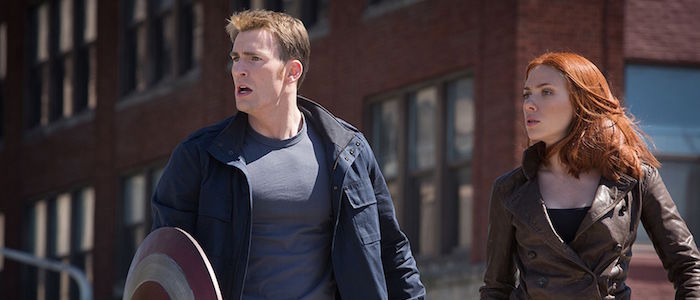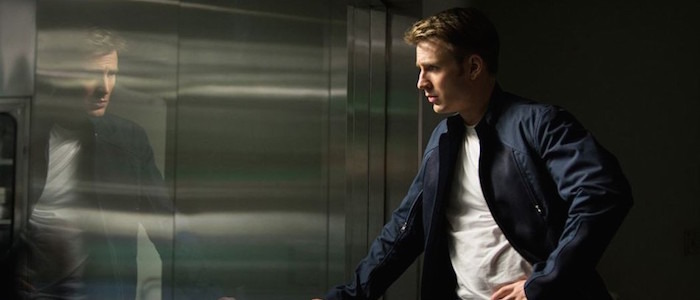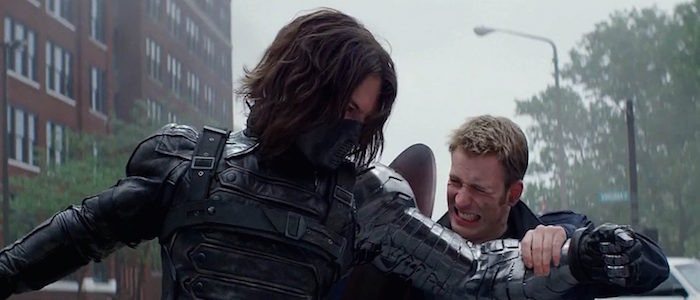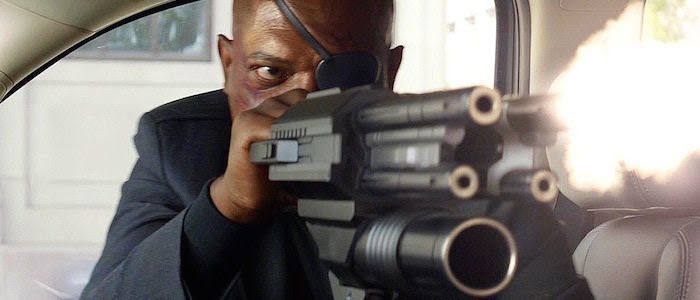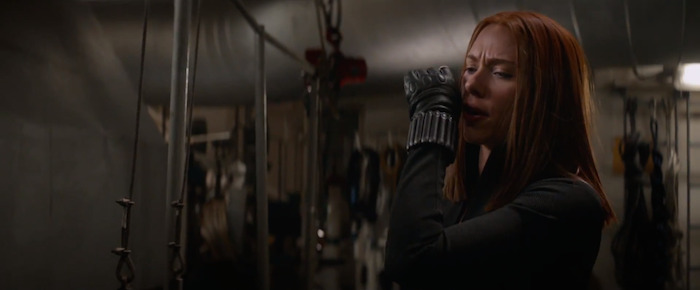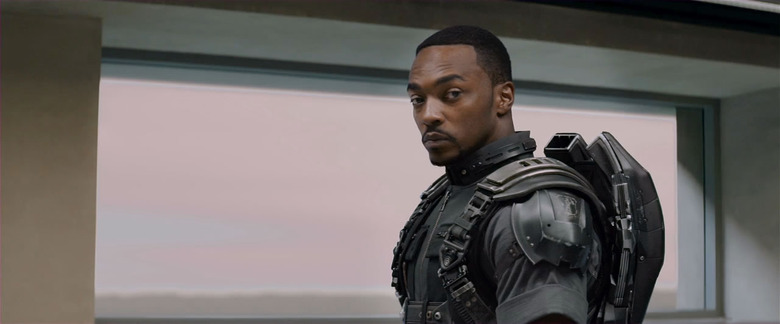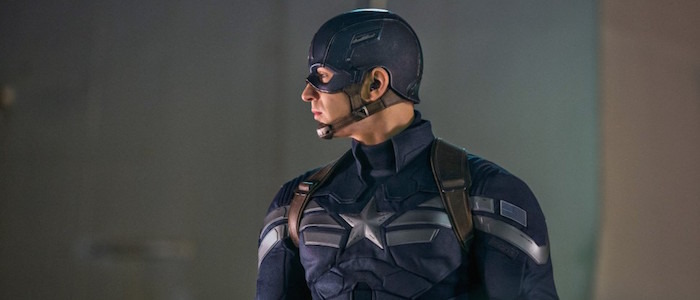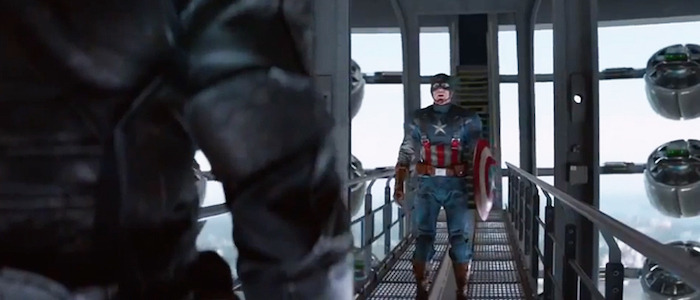Road To Endgame: 'Captain America: The Winter Soldier' Is A Thrilling Superhero Adventure Held Back By Some Troubling Choices
(Welcome to Road to Endgame, where we revisit all 22 movies of the Marvel Cinematic Universe and ask, "How did we get here?" In this edition: Captain America: The Winter Soldier, one of Marvel's best films, is also the third funded by the U.S. military)Nine films into its now 21 entries, the Marvel Cinematic Universe found its groove — albeit with caveats. The series' long-running imbalance is owed to both occasionally muddled character arcs and often-incoherent worldviews. For the most part, the MCU captures the texture of America's post-9/11 military politics, though it rarely has anything of significance to say about it. This superficiality has been a sticking point on the Road to Endgame, even for some of the series' very best entries.Marvel's backdrops are politically charged, if not outright political, but the way they're framed tends to act in contention with the stories being told. Captain America: The Winter Soldier falls unequivocally on the "incoherent worldview" side of things, however it succeeds more than its predecessors thanks to its clarity of character. It's arguably the best Marvel movie till date, combining slick action, taut structure and sincere performances, though it's hardly immune to the series' political pitfalls. After all, it was the third Marvel film to be partially funded by the Pentagon.
A Shield From Criticism
Marvel's incongruous political outlook is owed, in major part, to the series starting out as government propaganda. Like hundreds of Hollywood films, early Marvel movies like Iron Man and Iron Man 2 were produced with U.S. military assistance, which means they were also locked-in to scripts approved by the Department of Defense.The Avengers was eventually turned down for this assistance, though it certainly attempted to appease the Pentagon at some point during its production (U.S. military equipment ended up in the film regardless). And while Iron Man 3 seemingly alluded to Marvel's disagreement with the D.O.D — "There's no politics here... There's no Pentagon. It's just you and me." — the studio resumed its relationship with the U.S. government for its Captain America sequel, a partnership that continued until as recently as this year's Captain Marvel.Several scenes in Captain America: The Winter Soldier were filmed at an Army base near Cleveland, Ohio according to the Pentagon's Hollywood database (obtained via SpyCulture). In return, the Army received "a significant portrayal in the film" at "no cost to the government." A likely condition of this partnership, as with the Pentagon's production agreements on Iron Man and Iron Man 2, was Marvel ensuring none of this portrayal was negative.The result of this dynamic is a film, and a series, that only pays lip-service to questioning authority. The stories take aim at fictionalized structures, while real wings of U.S. government and their military policies remain unchallenged, despite them forming a major part of the fictional backdrop.The real-world military presence in these films is treated as a desirable norm, while the real-world problems they cause or exacerbate are passed off to fictional villains. In the process, the heroes ultimately fight to maintain the status quo, wherein U.S. militarism is framed as the more peaceful alternative. The Avengers never truly rattle the cage, not in any way that would create long-lasting change.The Winter Soldier's critique of drone warfare and data mining is the closest Marvel has come to speaking truth to American power, though it stops short at every turn. In prior entries like the Iron Man films (not to mention Captain America's own debut), the villains usually mirror some element of real-world authority, but they're made palatable to all audiences once they're stripped of real-world ideologies.The film attempts to use specific U.S. military methods (and their justifications) to grounds its character-centric story. However, it also continues the series' wishy-washy approach to power by letting real-world structures off the hook, shifting the blame for those methods to fictional entities (One has to imagine the film's D.O.D. overseers preferred the responsibility for overtly American problems be directed elsewhere).The result, while most certainly an exciting action-adventure, is a movie whose own story is frequently undercut. It teeters on the edge of substance, yet it feels constantly hesitant.
The Big Reveal
Understanding The Winter Soldier requires talking about its midpoint, a reveal that brings its themes into focus. Captain America/Steve Rogers (Chris Evans) and Black Widow/Natasha Romanoff (Scarlett Johansson) are fugitives from S.H.I.E.L.D., which has been recently compromised. This military outfit had a nebulous international allegiance in The Avengers, though its visual coding (and its Washington DC headquarters) make it closer to a defense branch of the U.S. government.After tracking down a mysterious data point, Rogers and Romanoff discover, embedded within S.H.I.E.L.D.'s very origins, the digitized consciousness of Arnim Zola (Toby Jones), one of Rogers' World War II adversaries. The real-life Operation Paperclip, which folded former Nazi scientists into American intelligence, resulted in Nazi science division H.Y.D.R.A spreading fascist ideology within American ranks. As it stands, H.Y.D.R.A. and S.H.I.E.L.D. are effectively one. They plan to kill anyone who might oppose them, though their impetus for doing so is un-specific; their ideology, once again, is "power" in the abstract.In previous Marvel efforts, the villains' plans often had a political façade, with something cartoonishly sinister beneath the surface. Obadiah Stane sought power in the form of Iron Men, the Abomination sought it in the form of big, green muscles, and Red Skull wanted power in the form of, well, magical powers. The Winter Soldier however, flips the script in that regard, retrofitting ridiculous-sounding comic elements like secret super-Nazis, a man in a computer, and even Batroc The Leaper in order to make them part of a larger political fabric. Here, the villains are driven by both in-universe history as well as political ideology, or at least something resembling the latter.Rather than infiltrating America from the outside, H.Y.D.R.A. has grown to become part of American governance over the decades. It is made up of American Senators and military personnel, from fighter pilots all the way to a member of the World Council. The Winter Soldier comic's Aleksander Lukin, a former K.G.B.-operative and modern-day avatar for the Red Skull's consciousness, shows up here as Alexander Pierce (Robert Redford), a stripped-down American vessel for H.Y.D.R.A.'s ideas. In the film, Pierce has always been an American, and his methods are drawn from America's real-world foreign and domestic policies. "Zola's Algorithm," the computer program that tells Pierce whom to target, is threat analysis through data-mining, not unlike the N.S.A. secrets exposed by Edward Snowden."Project Insight," the algorithm's next phase, involves drone ships picking off targets who pose a threat to H.Y.D.R.A.'s global security — or as Steve Rogers describes it, "Holding a gun at everyone on Earth and calling it protection." Functionally, these crimes are a carried out by members of the American military, working in the shadows, killing and spying with impunity, causing Rogers and Romanoff to realize they might not work for the good guys after all.On the other hand, revealing that covert Nazi infiltrators have been pulling the strings all along also waters down the narrative. The dilemma our heroes face is one of misguided allegiance, but this reveal makes it far too easy for them to come to terms with their mistakes. Rather than having to confront their place in a corrupt power structure, that structure is revealed to have secretly been another organization altogether, one that Rogers and Romanoff have never perceived as being the good guys. In effect, there's little need for them to introspect since it turns out they were duped. The film thus avoids all questions of America's role in these distinctly American methodologies.H.Y.D.R.A., while descended from Nazis, have little connection to Nazi ideology. Instead, the organization seeks to bring the world under singular rule, without any further framing as to what they stand for — or against. For a second time in the series, a Captain America film responds to the question of who would be most vulnerable to the villains' ideology with the same disappointing answer: America, and America only.In Captain America: The First Avenger, H.Y.D.R.A.'s immediate target was America, the military superpower, rather than any specific group persecuted by the Nazis. In The Winter Soldier, the result is similar; the immediate targets of "Project Insight" are mostly Americans on domestic soil. It's a horrifying image from an American standpoint, though as a metaphor, it's largely disconnected from its real-world equivalent. In either case, scrubbing the villains of specific outlooks means the characters opposing them needn't have specific allegiances. This Captain America neither fought for persecuted peoples during World War II, nor does he fight for victims of America's preemptive drone strikes in the Middle East. He only seems to fight for Americans.While Rogers battles a military apparatus meant to mirror that of America, the fight ultimately comes down to a simplistically framed binary (despite the film's musings about the world being more complicated than it once was). Captain America, draped once more in his red, white and blue, attempts to stop the Nazis — one of the unambiguous villains of World War II — from carrying out mass murder. It doesn't hold much weight as a metaphor, even in the context of post-2016 America, whose own Nazi resurgence is tied to unconfronted elements of white supremacy in American life and government.In The Winter Soldier, American governance is implicitly framed as the peaceful aspiration. Its disruptors — both now and throughout history — are fictitious foreign infiltrators, who secretly perpetrate America's real-world crimes. "Coups, assassinations and proxy wars? Couldn't be me."What else is one to expect from a film, even a great one, made in part to promote the U.S. military machine?
Ghosts of the Past
Despite The Winter Soldier's conflicting politics, the way its plot interacts with its characters is where the film eventually shines. While its outlook on power leaves much to be desired, the individual perspectives driving the plot — and how they interact with a changing world — make the film engaging. Whatever the story has to say, it never says it in a way that's boring.Almost every dialogue exchange comes from a place of opposing viewpoints, building on characters bit-by-bit as they respond to larger events. You could write an entire essay about any individual scene (I considered it; the film is meticulously detailed) and Steve Rogers having to recalibrate his loyalties works as a character-centric theme, regardless of the film's political specifics. As a narrative idea, it's enough of a blank slate that you can project your own politics onto it.The first scene that stands out in the film, both from an emotional and structural standpoint, is Steve Rogers visiting his long-lost love, Peggy Carter (Hayley Atwell). Rogers was lost to time during World War II. After his apparent death, Carter had to move on without him. Seventy years later, while still in his visage from the 1940s, Rogers continues to visit Carter at her nursing home, seeking advice from the woman who owed him a dance, but has lived a full life since.Now a soldier for S.H.I.E.L.D., Rogers tells Carter that he wants to keep doing the right thing, though he no longer knows what that is. Not only does this scene articulate Rogers' confusion about the current state of the world, it establishes the urgent need for him to find his place in the present, given his relationship to the past.Natasha Romanoff jabs Rogers about being a fossil at the Smithsonian. He accepts his place in this dynamic, joking about barbershop quartets in return, but the museum has, in fact, idealized him and his comrades in the form of an exhibit. Rogers, a man who once charged into battle draped in the American flag, now works from the shadows, for men who compartmentalize secrets and carry out covert missions that they dare not put America's name to (or rather, S.H.I.E.L.D.'s).Rogers' new uniform is stripped of all colour, inspired by the outfit he wore in the comics after giving up his American mantle. The ideals of the past are a compass he can no longer cling to. While not seen in The Winter Soldier, the physical compass Rogers carries with him, in both prior and latter films, holds Peggy Carter's picture; she is his only constant, tethering him to an old-world morality he can't help but question.Rogers' museum trip leads him to Carter for guidance, but Carter is old and ill. She keeps forgetting Rogers is still alive, and still lost in an unfamiliar time. To Peggy Carter, Captain America is still frozen in an era where colours were bright, where answers were easier, and where the world made a little more sense. The past remembers Captain America, but the present is forgetting Steve Rogers.
Who the Hell is Bucky?
Only one other living character knew Steve Rogers when he was a scrawny kid from Brooklyn. Unbeknownst to Rogers, his best friend Bucky Barnes survived his own icy plunge during World War II, and was captured by the other side. Brainwashed and taught to kill without remorse, Barnes was turned into an embodiment of America's own covert crimes and secret power grabs, though the film daren't frame him as such.Barnes is now the Winter Soldier, H.Y.D.R.A.'s key assassin, shaping history from the shadows, like some super-powered CIA operative. He's framed as a dark mirror to Captain America, following orders without question, but their dynamic as dueling sides to a nation's ethos is never once explored — it would likely never have received the U.S. military's go-ahead even if this was intended. An unfortunate (but inevitable) consequence of a film about speaking truth to power having to satiate power itself.Barnes' memory, and thus his morality, have been wiped. He is everything Rogers fears he may become if he loses his way, an outcome that enters the realm of possibility once answering to any authority begins to feel risky. Luckily, Captain America isn't alone in his fight. Steve Rogers is a fixed point in a rapidly evolving world. His narrative function is not to change, but to change those around him, especially those who find themselves lost and in search of purpose.This means changing Natasha Romanoff, the former K.G.B. assassin who still gets her hands dirty. This means changing Sam Wilson a.k.a. The Falcon, a former soldier trying his best to stay righteous after letting his wingman die. And it means changing S.H.I.E.L.D. director Nick Fury, a man whose secrets have secrets, and a leader whose inability to trust people makes him an unwitting pawn.
Fury, Nicholas J.
Nick Fury believes in prevention. His formative memories include a grandfather who carried a loaded gun in order to ward off muggers, a philosophy he magnifies in the form of S.H.I.E.L.D.'s new long-range gunships. While Fury himself would likely not seek to use them on civilians, his continued belief in the power structure he sits atop catalyzes his downfall.When faced with how to proceed, Fury hopes to salvage S.H.I.E.L.D. from individuals who have tarnished it, but Steve Rogers knows better and harshly convinces him otherwise. Rogers has seen what happens when power corrupts; there were no good Nazis in World War II, and so S.H.I.E.L.D. itself must go. It's grown too powerful to be controlled responsibly, even once H.Y.D.R.A. is weeded out.To Fury, the problem is likely rogue elements within S.H.I.E.L.D. rather than S.H.I.E.L.D. itself, an organization tasked with deciding who gets to live or die. Though, while Rogers proves Fury wrong through dialogue, the narrative ultimately sides with Fury in this regard — another consequence of whom the film aims to please — since American S.H.I.E.L.D. members un-exposed to H.Y.D.R.A. continue to be framed as unambiguously good.Instead of confronting the ideology of S.H.I.E.L.D., which created a lethal apparatus for H.Y.D.R.A. to usurp, only the misuse of these ideas is called into question, rather than the ideas themselves. While civilian-murder is framed as requisitely horrendous, the H.Y.D.R.A. reveal sidesteps the need to question pre-emptive strikes as a whole. After Rogers' initial objection to Fury's plan ("This isn't freedom. This is fear."), the film never returns to this subject.Unsurprising, given how closely these ideas strikes mirrors the last two decades of American foreign policy, the direct critique of which would have been a non-starter for the D.O.D.
Romanova, Natalia Alianovna
Like Fury, Natasha Romanoff believes in S.H.I.E.L.D., at least at first. She switched allegiances from the Kremlin to the White House, believing herself to finally be on the side of good, but this was a decision she couldn't have been sure of. Not when her very identity was flux, moving from cover to cover while she did what she had to, no matter the cost. Without figuring out who she was outside these structures and secret identities, or whom she was willing to trust, Romanoff had no way of drawing moral lines, and no one to show her how.Now working as Fury's personal thief, how far would Romanoff be willing to go in service of her new country? She still has "red in her ledger," as seen in The Avengers. She's still weighed down by violent acts from her past, but her more recent missions weigh her down even further, as she realizes she may be on the wrong side of history once again.The truth has been "a matter of circumstance" to Romanoff for some time. She sees Rogers' old-world sincerity as being out of its depth and out of step with modernity, and she tells him he's in the wrong line of work if he hopes to have friends. She even teaches him to lie and to hide in plain sight. However, Captain America, the symbol, soon becomes divorced from the structures representing American defense. It's here that Romanoff finally sees Rogers as a man representing truth and justice, when "the American way" no longer can.Of course, Rogers' and Romanoff's perspectives are no longer tethered to national identities, given the degree to which America is swapped out for S.H.I.E.L.D. Captain America is only ever called a "fugitive from S.H.I.E.L.D." rather than a fugitive from the American government. In the process, the duo's introspection is limited to fictional syndicates whose broader effects on nationalism and identity are never explored, despite the film's own themes hinging on the recalibration of nationalist outlook. Still, the characters' interpersonal dynamic, and the way it functions within the larger plot, grants the film its momentum. Rogers carries Romanoff to safety after S.H.I.E.L.D. drops a bomb on them, and it's here that Romanoff learns that trust — something between two people, rather than between a spy and her government — is what's going to keep her alive. She has a new willingness to be seen, owing to Rogers looking beyond her misdeeds and treating her as a friend. This willingness allows her to blow the whistle on S.H.I.E.L.D. without hesitation. Romanoff, a woman once dependent on secrecy, dumps all of S.H.I.E.L.D.'s dirty secrets onto the web, including the ones involving her past.Each character in the film espouses a political outlook rooted in their respective histories. Those who have a stake in the current goings on — Rogers, Romanoff, Fury, Pierce — and even those who don't, but still get involved in order to stop their past from defining them, like Captain America's friend The Falcon (Anthony Mackie), the first African American superhero.
Exo-7 Falcon, Classified
A social worker-turned superhero in the comics, the film version of Sam Wilson is a military veteran who retains the core of his comicbook counterpart. He's first and foremost a helper, working to counsel other veterans afflicted by guilt and regret, since his own guilt over failing to protect his partner caused him to leave the field.Wilson is the closest thing the film has to a direct line to American militarism. While he's part of a fictional air rescue program, he's also unequivocally framed as a returning Afghanistan veteran. He speaks to other former soldiers in the hopes of helping them re-adjust, and he does so as part of the Department of Veteran Affairs.This is the only time a real branch of the U.S. military is seen in The Winter Soldier. However in real-life, the V.A. is tasked with helping returning soldiers deal with disability, P.T.S.D. and thoughts of suicide (among other issues), but Wilson's conversations with Rogers' are limited to the kind of beds they sleep on and being behind on popular culture, neither of which seem to impede their daily lives.Just as Iron Man 3 promptly drops its P.T.S.D. story, there's little sense that either man has any lasting trauma from war. This calls to mind the heated on-set exchange between Iron Man director Jon Favreau and Department of Defense liaison Phil Strub, during which Strub objected to a line of dialogue where a U.S. soldier mentions suicide — a continued problem afflicting U.S. veterans.Despite the common thread between Wilson and Rogers — their inability to adjust as returning soldiers — the actual nature of this problem, beyond minor inconveniences, is almost entirely obscured. Wilson is written as having a vague sadness about him (Mackie's performance is heartfelt), though Wilson never comes across as a man who was forced to watch his friend die in battle (For that matter, neither did Rogers during the final act of Captain America: The First Avenger).When Rogers comes asking for his help, Wilson doesn't hesitate. His journey isn't as complicated as Fury or Romanoff's — rather than a solider or spy with shady dealings, he was explicitly a rescue operative — but he serves as an embodiment of the kind of change Steve Rogers can inspire: the desire to fight for good.Like a kid getting to see his favourite superhero up close, "Dude, Captain America needs my help" is reason enough for Wilson to take back to the skies. The decision, however, comes far too easily in a story where Wilson and Rogers' first interaction is about the lasting effects of war.As one might expect from military propaganda, the personal fallout of war doesn't seem that bad.
Fighting the Good Fight
Among those willing to resist H.Y.D.R.A. is a low-ranking technician played by Aaron Himelstein. He's tasked with launching H.Y.D.R.A.'s gunships in order to — like the World Council's nuclear launch in The Avengers — kill millions to protect billions. The character has no superpowers, nor any real stature or with which to retaliate. Yet he struck such a chord with many fans because he fought back regardless."I'm not gonna launch those ships. Captain's orders."With a single line, delivered not fearlessly, but while cowering at gunpoint, a nameless featured extra embodies everything that makes Captain America great. Steve Rogers, the little guy from Brooklyn, gives other little guys the strength to stand up."Captains orders," repeats Sharon (Emily VanCamp), a formerly duplicitous agent who finally chooses a side. Soon, the whole room of technicians draws their guns on a H.Y.D.R.A. strike team, led by Brock Rumlow (Frank Grillo), resulting in a staff full of ill-equipped heroes doing what little they can to resist.While the scene can't be divorced from larger questions about the heroes' and villains' politics, it's arguably on par with what is generally considered the best sequence in a superhero movie: the citizens of New York standing up to protect Peter Parker's identity in Spider-Man 2. In both cases, the films in question dramatize the very narrative purpose of the superhero, a power fantasy aimed at providing inspiration and moral guidance.
Till the End of the Line
Captain America refuses to leave the crashing gunship without first freeing Barnes from debris. This isn't the only thing that makes Rogers a hero. It's also the fact that he lingers even longer to remind Barnes of the person he once was. The past is all but lost to Steve Rogers. He's begun the process of tearing the old world down by destroying S.H.I.E.L.D., but he sticks it out with Barnes as the ship goes down, dropping his guard entirely. Like the room full of technicians, Barnes eventually does the right thing too, even though he's far from who he once was.The film's third act, while as bombastic as any Marvel climax, is also a potent articulation of Captain America's inner-conflict. Just as he learns to move on from the past, his only remaining connection to it returns from the dead, taking the form of everything he fears he might become. Captain America, the man out of time, is forever trapped between a past he can't escape, and a world changing far too quickly.Barnes doesn't remember Rogers. He's been subjected to too much torture, and has had his mind wiped too many times. But he saves Rogers from a watery grave, having been reminded of something deep within him. Steve Rogers is merely Barnes' mission, a stranger who ought to have every reason to kill him. Yet he treats Barnes in a way he hasn't been treated in decades: like a friend.That's why Captain America, and Captain America: The Winter Soldier, ultimately work. Rogers isn't just a hero on his own; whether Wilson, Romanoff, Barnes, or some nameless kid at a desk, Steve Rogers reminds these other characters of their intrinsic goodness, and becomes the moral focal point of the series in the process.Rogers' morality is eventually put to the test in later films, in ways that are more direct and more focused than this film's half-hearted C.I.A. metaphor. The Winter Soldier is undoubtedly on a leash, prevented from fully approaching all the things its characters need to confront. They have some of their biases challenged, but those biases remain disconnected from our own.Once again, the Marvel machine pays lip-service to change, falling back on a real-world status quo despite the upending of fictional norms. However, the film remains rooted in a story about unflinching heroism in ways few Hollywood blockbusters are. It's more coddling than challenging in any significant way, but it's undoubtedly effective at being "feel-good," for whatever that might be worth.By the time Avengers: Engdame arrives, Captain America will have clung to his moral compass — one that prevents him from trading lives — despite it having failed him. Is this the right decision? That remains to be seen, as does what lasting mark, if any, Steve Rogers will leave on the Marvel Universe.
***
Expanded from an article published April 12, 2018.

